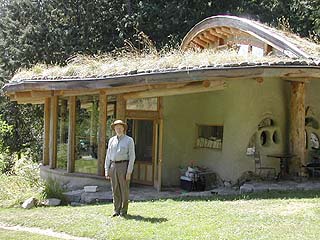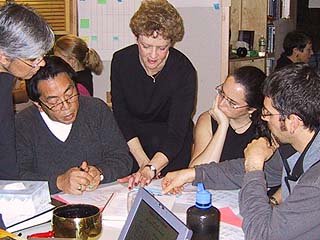
Surveys
DJC.COM
July 17, 2003
Laying the path for responsible education
Bainbridge Graduate Institute

Dunsky
|
This is the philosophy behind the Bainbridge Graduate Institute, a Northwest business school that offers an MBA education that fully integrates environmental and social responsibility into all of its courses.
While a number of other schools have developed programs with a focus on the environment, BGI is one of the first graduate schools devoted to sustainable business.
“BGI trains business leaders to create profit in ways that contribute to taking care of people and the planet,” Pinchot said.

Photos courtesy of Bainbridge Graduate Institute
Gifford Pinchot stands by “Cob” house, the main meeting room at Bainbridge Graduate Institute’s Cortes Island campus in British Columbia.
|
BGI’s mission is twofold: first to train a diverse group of future leaders in creating and managing environmentally and socially responsible (ESR) businesses and nonprofit ventures; and second to develop curriculum and encourage other business schools to incorporate social and environmental responsibility into their programs.
The BGI faculty includes leaders in the sustainability movement, such as resource conservation guru Amory Lovins, coauthor of Natural Capitalism and cofounder of the Rocky Mountain Institute, and John Ehrenfeld, executive director of the International Society for Industrial Ecology and former director of the MIT Program on Technology, Business and Environment.
In addition, the program draws on innovative and forward-thinking corporate leaders, environmental educators, entrepreneurs, change agents and scientists.
The student population is varied. Many of BGI’s future MBAs are environmental entrepreneurs who want to start and run their own ESR businesses, as well as innovative professionals who want to promote sustainability initiatives inside their existing organizations.
“What I’m learning at Bainbridge Graduate Institute I incorporate into my work every day,” said James Soares, manager of several Ben and Jerry’s stores in Salt Lake City. “And so far, everyone has been very excited about the results, including the owners, customers, employees, vendors and the community.”
Current students include the chairman of a public utility, present and former senior sustainability managers at Hewlett Packard and Shell, successful entrepreneurs, a cofounder of the world’s leading co-housing company, engineers, a prize-winning documentary filmmaker and an environmental artist. The environmental artist has spent 20 years restoring urban parks and abandoned places using inner city youth to build gardens and create beauty with plants that stabilize the soil.
Environmental roots
The Bainbridge Graduate Institute was founded in 2002 by Elizabeth and Gifford Pinchot and Dr. Sherman Severin. Working together in the Pinchots’ consulting practice, the three conceived the idea of a business school devoted to integrating traditional business tools with their deep concern for the environment and human well-being. The idea was to take what they had learned through years of success in business and education and apply it to building a better world.
The recent spate of scandals at companies such as Enron and Worldcom has generated an increased appetite for ethics in business. At BGI ethics is not just about following the law and reporting honestly; it goes beyond that to the root of what the organization does and the effects it has on its communities and the world.

Students discuss an exercise at BGI’s Bainbridge Island campus.
|
“BGI’s new MBA program in sustainable business practice is unique in the MBA world and on the leading edge of a wave that will soon break,” said Rick Bunch, director of business education at World Resources Institute’s sustainable Enterprise Program. “BGI’s program incorporates precisely the training in sustainability and environmental stewardship that WRI’s Beyond Grey Pinstripes report has identified as missing from most business school curricula.”
Sherman Severin, president and cofounder of BGI, agreed. “Building the curriculum for a sustainable and socially responsible MBA program is one of the largest challenges we face,” Severin said. “We are endeavoring to enhance the approach of standard business school courses by bringing in relevant sustainability perspectives in every subject.”
For example, the study of supply chain management at BGI includes not only the reduction of inventory and cost cutting through closer relations with suppliers, but also techniques to ensure sustainable practices and social responsibility throughout the entire value creation chain. In addition to the standard marketing topics, BGI’s marketing courses include a look at the history of green and social cause marketing, with consideration of what works and what doesn’t.
Balance
There is widespread interest in an education in sustainable business. Many potential students need the skills taught in business school, but will not attend an institution that considers it the single purpose of business to make ever more money for shareholders, regardless of human and environmental costs.
“Our students want to succeed in business, but not at the price of damaging their communities and their souls,” Pinchot said. “Traditional business schools have not yet figured out that this type of potential student is a big part of their total market and that it includes many of the brightest and most interesting prospects.”
Business school students polled in 2002 expressed a strong interest in seeing more consideration of social responsibility in core courses. In a recent study of students in 12 international business schools, “half of the students surveyed acknowledge that the priorities communicated during the MBA program may have been a contributing factor in corporate misconduct,” according to the Aspen Institute Business and Society Program.
“If the leaders of the dominant institution of our time are trained to focus only on the greatest financial return for shareholders, then society and the environment are headed for disaster,” Pinchot said.
“Being socially and environmentally responsible is good for the bottom line,” said Kate Kaemerle, a public relations consultant and BGI student. “It can be a market differentiator if your business is green and your competitor’s is not. And it’s not only a benefit for your marketing efforts, but it makes a difference to your employees and vendors as well. It’s a win-win-win.”
BGI’s MBA students meet face-to-face three times per quarter. The remainder of the time, the program uses distance-learning methods, including a combination of reading, writing, teleconference and online conversation. Students post homework to a secure Web site, where faculty and other students can read and engage in conversation about the work.
The student body for the most part moves together as a learning community through a preset sequence of courses. The program can be completed in two or three years.
BGI is now accepting students for the fall 2003 academic year.
Halim Dunsky is a core faculty and director of distance learning at Bainbridge Graduate Institute. For over 25 years, he has helped find creative solutions to difficult technical and human challenges. He holds an MA in organizational systems from Saybrook Graduate School, and a BA in communications from Northwestern, where he also did graduate study in industrial engineering and management science.
Other Stories:
- Battle over keeping dams rages on
- What’s your vision for Seattle’s future?
- Hat Island gets a drink from the sea
- Foss Waterway cleanup kicks into high gear
- Reclaimed water — a ‘new’ water supply
- LOTT dives into reclaimed water
- Clean air: saving our competitive advantage
- Europe points the way to sustainability
- Old maps handy for site investigations
- Planning for an environmental emergency
- Engineered logjams: salvation for salmon
- Pierce County maps where its rivers move
- Be prepared with a spill management plan
- Development can be beneficial to wetlands
- Check out properties with microbial surveys
- Charting a sustainable course for the Sound
- Water rights no longer a hidden asset
- The economics of sustainability
- Squeezing more out of renewable energy
- Controlling mosquitos and the environment
- Beavers back in force in the Seattle area
- Our future: no time or resources to waste
- Port Townsend dock promotes fish habitat
- Brownfields program is here to stay
- Master Builders teaches green homebuilding
- Sculpting a park out of a brownfield
- A salmon-friendly solution on the Snake
Copyright ©2009 Seattle Daily Journal and DJC.COM.
Comments? Questions? Contact us.